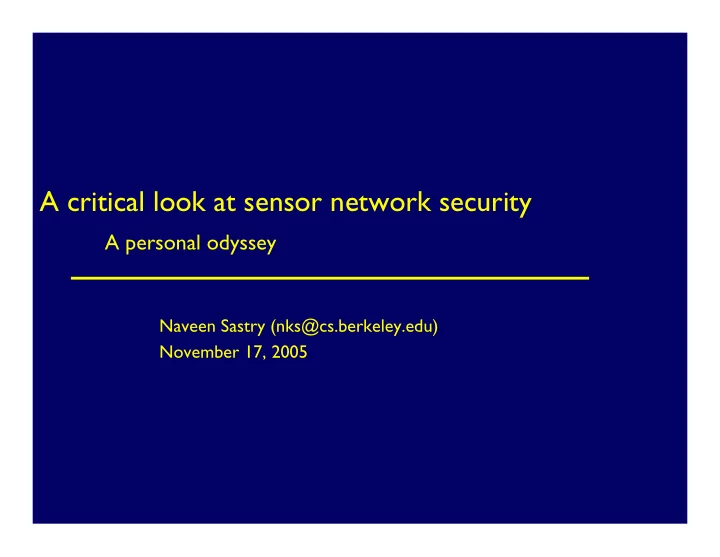

A critical look at sensor network security A personal odyssey Naveen Sastry (nks@cs.berkeley.edu) November 17, 2005
Outline 1. Claim: conventional wisdom 2. Counter-claim: my view 3. Tools 4. Design example 5. The real worry 6. Recap & rant
1. A Claim
Conventional wisdom Sensor network security is different from fixed infrastructure security
Conventional wisdom: evidence (1) • Resource constraints • TinyPackets • TinyProcessors Software solutions not feasible • TinyMemory e.g. no public key • TinyOperatingSystems
Conventional wisdom: evidence (2) • Mismatch between attacker & victim network Vs • No physical security (maybe the blackberries will bring some bears to watch over…) • Compromised nodes • Jamming
Hold up: What are the problems? • Securing communications • Confidentiality • Integrity • Access Control • Keying • Key distribution & update • Any-to-any communication • Detecting compromised nodes • Secure infrastructure services Routing Secure + Localization Time synchronization
2. Counterclaim
Counterclaim Sensor network security is different from fixed infrastructure security Sensor network security is similar enough to fixed infrastructure security
Threat models • Commercial (buildings/industrial plants/…): • Nodes under single administrative control • Minimal / low mobility • Single install time • No DoS worries • Pretty good physical security • Millitary • Mobility! • Smart adversaries • Rich adversaries • DoS is the objective
3. Tools
Link layer encryption SPINS (‘01) Secure 2-way communication Sender, receiver synch problems Assumes: TinySec (’04) Pre-shared keys Prevents packet All software, <8% overhead injection 802.15.4 (’04) modification eavesdropping In hardware, essentially free • Based on symmetric key cryptography • Efficient (worst problem: ~8-16 bytes per message) • Shared keys required • Keys must be protected
Public key encryption • Sizzle from Sun • Uses elliptic curve cryptography • RSA is slow, large (1024 bit operations) • ECC is just as secure at 160 bits, much faster From Vipul Gupta, CENTS Retreat Jan 2005; CHES 2004 8 Mhz Atmel 128
Tamper resistance • Single chips • Good also for security • Careful hardware design Increasing • Eliminate side channels (power & timing attacks) cost • Packaging • iButton & smartcards • ~ $1
For the paranoid… • IBM 4758: No known physical attacks • Mitigate cost: two tiered network • Trusted & protected infrstructure • Ordinary nodes • Jamming proof radios: • Frequency hop based on shared secrets • Spread spectrum
4. Design Example
Securing refinery infrastructure [Pister TRUST] • Need to be able to deploy additional nodes to replace busted ones • Problem: How to get existing nodes to recognize new node? How to exchange keys?
Details… • New node needs some credentials for master to accept it K • Standard options: • Key rotations • Public key K K • Location limited channel: bring new node next to master • Alternative: PDA K
5. The real worry
Wormholes: routing K K K K K K K ADV K K • Forwards traffic K • No keying required K • Increases load K • Traffic analysis • Selective forwarding K • Disrupts routing K properties
Other wormhole attacks: localization K K K K K K K ADV K K • Rebroadcasts at different K signal strength K • Still no key required K K K
Other wormhole attacks: time syncrhonization K K K K K K K ADV K K • Delays traffic K • Still no key required K K K K
Wormhole directions? • Packet leashes: • Nodes know layout • Have tight time synchronization (e.g. from GPS) • Time each packet in flight. • Doesn’t help for time synchronization application • Frequency hopping radios • Must use keyed hop schedule • Must hop quickly (every symbol?) • Generally, military grade radios • Nothing cheap or particularly effective
Recommend
More recommend